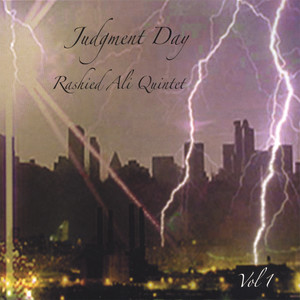
- 歌曲
- 时长
简介
Drum Beat from the May 2006 issue RASHIED ALI Judgement Day, Vol. 1 & 2 (Survival) For the past 20 years Rashied Ali has been operating like an Art Blakey figure in terms of discovering and nurturing new talent. His current working quintet is another cross-generational affair featuring veterans Greg Murphy (piano) and Joris Teepe (bass) and two new firebrands in Lawrence Clark on tenor sax and Jumaane Smith on trumpet. Together this tightly knit group swings in fairly conventional postbop fashion on rarely covered tunes like Frank Lowe’s “Sidewalks in Motion,” Jaco Pastorius’ uptempo blazer “Dania,” Wayne Shorter’s “The Big Push” and James Blood Ulmer’s “M.O.” Teepe, a powerful, deep-toned bassist in the Paul Chambers tradition, contributes the moving ballad “You’re Reading My Mind,” while saxophonist Clark, who blows heroically throughout these two discs, offers the exhilarating title track, a modal workout with distinctly Middle Eastern touches that has pianist Murphy dipping deeply into his McCoy Tyner bag. Other highlights in these two energized sets include Murphy’s burning “Skane’s Refrain” and Smith’s frantically swinging “Yesterday (J-Man) Tomorrow,” along with dynamic readings of Billy Strayhorn’s “Lush Life,” Thelonious Monk’s “’Round Midnight” and Don Cherry’s “Multi-Culti.” Though this band rarely plays outside of New York City, this is one of the more potent working quintets in jazz today. -Bill Milkowski ©1999-2006 JazzTimes, Inc. All rights reserved Dusted Reviews Artist: Rashied Ali Album: Judgment Day, Vols. I & II Label: Survival Review date: Feb. 26, 2006 These two new quintet dates confirm what I have long believed, that Rashied Ali is one of the most underrated drummers to emerge from the turbulently exploratory 1960s. Only one aspect of his multicolored playing has gotten anything even close to the examination and discussion it deserves, and anyone reading this knows of the fire, brimstone and thunder he brought to Coltrane’s final period. Yet, listen to the subtlety, introspection and sublimated magic of his brushwork on a track like “Ogunde” from Expression, or to Marion Brown’s second ESP date, and you will have some idea of what else to expect in these more recent ventures. All of the tunes on Judgment Day are either acknowledged classics or homage’s to established masters. Steve Dalachinsky’s unerringly perceptive liners quote Ali as saying “If they can play Beethoven, why not Coltrane?” While Coltrane is not represented here – Ali’s Prima Materia project paid him beautiful respect – the quotation is apt in that the music of such undeniably influential figures as Monk, Shorter and Strayhorn are rendered with faithfulness and fluent unpredictability. “Round Midnight,” from Vol. II, is a stunning case in point. The familiar introduction is treated here with just a hint of the “free” playing associated with Ali’s early recordings, bassist Joris Teepe’s tasty interjections being particularly noteworthy. Trumpet and sax use vibrato to great effect, a signifier that, in tandem with Greg Murphy’s slyly intuitive incorporation of Monk’s pianisms, invokes the “swing” at the heart of Monk’s rhetoric and rhythm. Lawrence Clark’s tenor tone is lush and full, enhancing the allusion. Just as the tune is about to end, Ali breaks into a funky Latin-tinged groove, the quintet sound turning lush and sumptuous all at once. It’s a gesture of which Monk would certainly have approved, given his ear for all manner of shifts in arrangement. Both volumes abound with small but revelatory surprises of that nature. Trumpeter Jumaane Smith’s “Shied Indeed” – one for the leader – sports one of the hippest stop-time unison breaks I’ve heard in quite a while. It jumps right out of the middle of a simple but effectively modal head, broadsiding the unsuspecting listener with a brick-textured chunk of hard-edged compositional prowess. As with the Monk treatment, Dalachinsky is right to point out the temporally multifarious aesthetic of the playing; roots and branches of the creative music tree are often apparent in one sweeping gesture. Nowhere is the fluidity of temporal perception more evident than in Ali’s drumming. Ali has expressed repeatedly his preoccupation with the expansion of time, of his constant development of time elasticity. The Jaco Pastorias tune “Dania,” from the first volume, has one of the briefest but most powerful solos I’ve ever heard from him, and much of its interest is generated by its architecture. Ali breezes effortlessly through some of the most intense circumlocutions and syncopations imaginable, only to return to a steady four, as if he’d never left. Throughout these temporal juxtapositions, his ear is constantly on timbre, key rhythmic moments warranting bullets and bombs from his multivalent arsenal of snare attacks. The quintet, diverse in age and background, manages to sound unified without any player losing individuality, and part of this is due to the skill with which the albums were recorded and mixed in Ali’s Survival Studios. The sound is direct without being overbearing, just as the playing is referential without being idiosyncratic or maudlin. These are fantastic discs that exist inside the tradition while offering repeated opportunities for its fresh appraisal. By Marc Medwin ©2002-2005 Dusted Magazine. All Rights Reserved.







